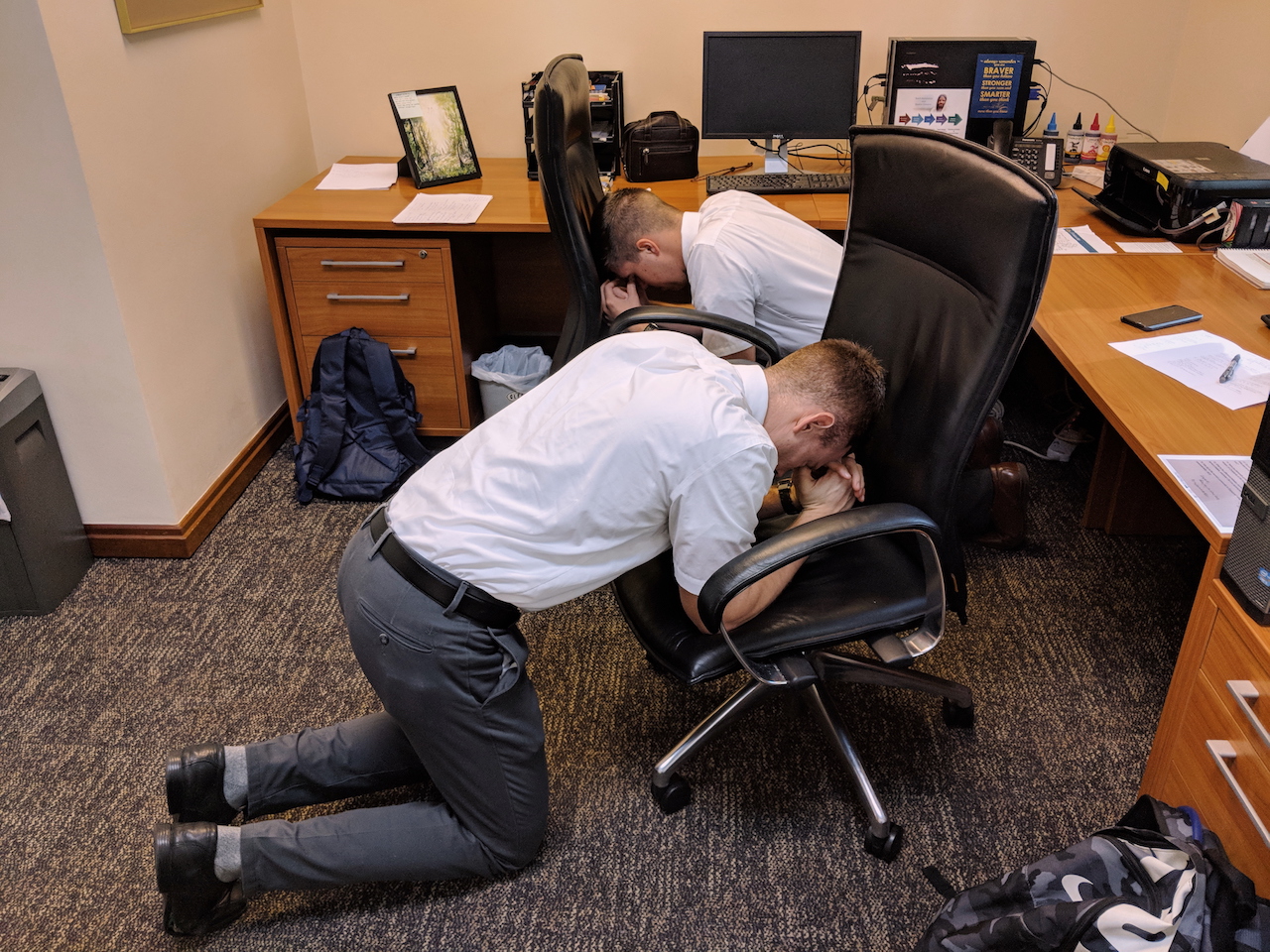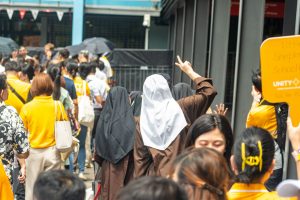It is not until I am doing push-ups in a parking lot alongside two Mormon missionaries that it occurs to me how surreal this entire situation is.
The two guys, who are from the Church of Jesus Christ of Latter-Day Saints, have posed me a fitness challenge. While I do push-ups, they’ll do pull-ups. We both have a minute to do as many as we can, and whoever loses buys the next meal for the day.
In the end, I complete 40 push-ups while they finish a whopping 46 pull-ups. It’s official: lunch is on me. I am also not as fit as I think I am.
Sobering reality aside, this Monday morning workout resembles any standard gym session for these men, complete with weights and cardio. I almost forget that this encounter with the missionaries didn’t come easy.
Back in June, I approached the Church to ask for permission to shadow a missionary for a whole day, not knowing what to expect. Known as Mormons to the average person, they prefer to be called missionaries or members from the Church of Jesus Christ of Latter-Day Saints.
All I know about their faith is that it’s the only denomination of Christianity that believes in living prophets (i.e. human beings who are prophets of God), and that they have an additional Book of Mormon besides the Bible.
When the Church finally granted my request after a month of clearing official processes, they assigned me to missionaries Elder Olive and Elder Johnson, who’re both from the United States. I’m told that missionaries usually work in pairs.
Mondays are usually ‘rest days’ to run errands and prepare for the week ahead, and in order to experience their regular daily routine, I promise to do everything with them … including their hour-long workout.
That is how I find myself dead tired on the gravel along Bukit Timah Road, perspiration streaming from my forehead into my eyes. This, I suppose, is the most ‘normal’ a day with missionaries can get.
While I melt under the merciless morning sun, Elder Olive and Elder Johnson continue to be ridiculously energetic. I already know I’ll have a lot of keeping up to do today.
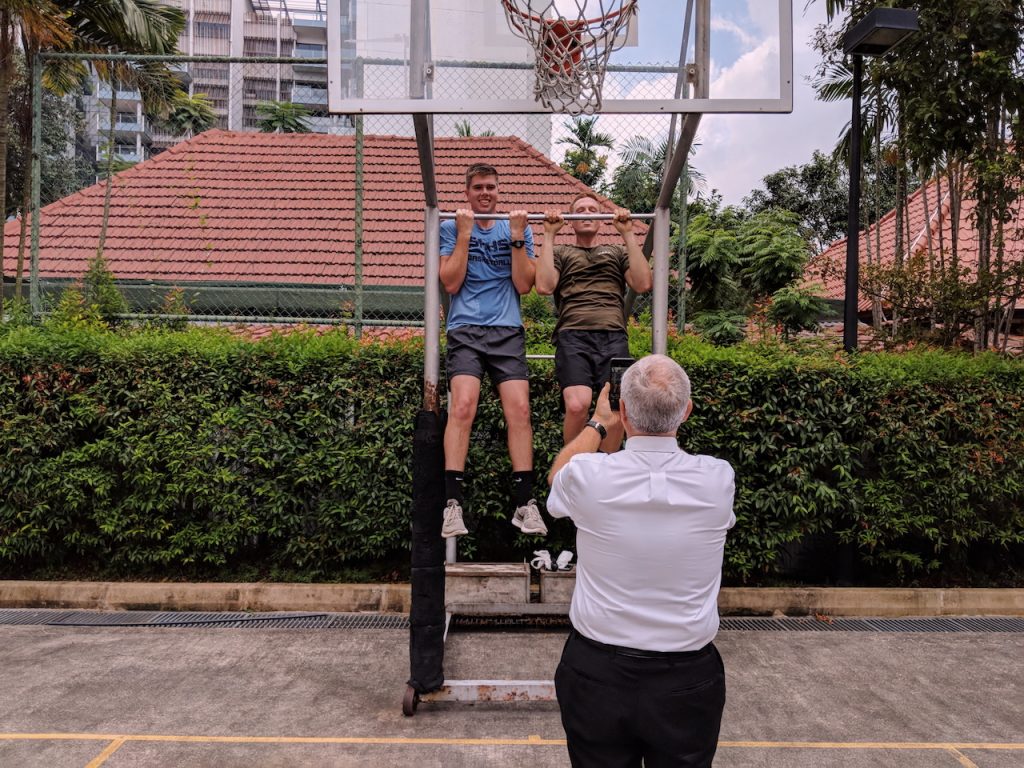
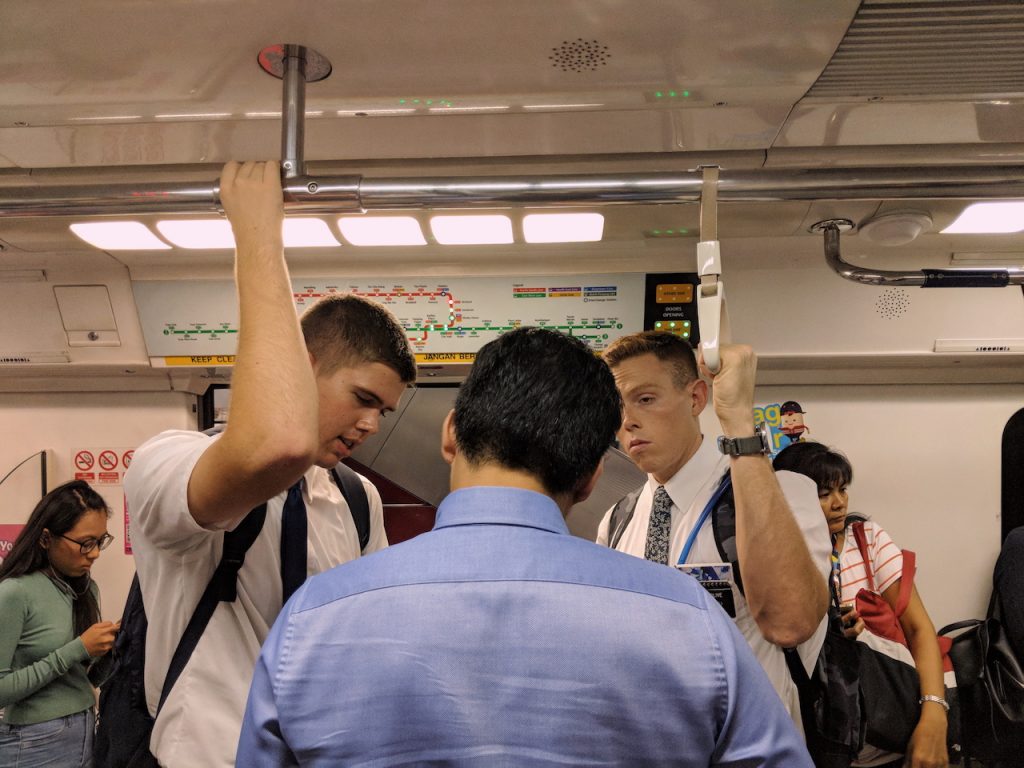
In layman terms, a mission is a period of time when a member of the Church dedicates his life to sharing the Gospel with others strictly through Church-sanctioned activities.
Elder Olive, who is 25 this year, worked for about year at Goldman Sachs from 2015 to 2016. Prior to living in Singapore, he was in Johor Bahru for another part of his mission; he’s previously lived in Thailand, Cambodia, and Laos. And having been in Singapore since April this year, he’s no stranger to Southeast Asia’s mind-numbing humidity.
Elder Johnson, on the other hand, tells me that he’s just finished high school. At 19, he’s just been accepted to start at Brigham Young University when he gets home, a private college that’s owned by the Church. He’s been in Asia for a year, and arrived in Singapore around June.
Both the Elders make it clear that missionaries cover their own expenses for their missions. Lasting two years, each mission trip costs about USD $10,000, no matter which country they’re posted to. To ensure each missionary is sufficiently taken care of, regardless of their host country’s standard of living, the Church redistributes money accordingly.
It’s no small sum, especially for someone fresh out of school; Elder Johnson tells me he worked part-time throughout high school to pay for this mission. The steep cost makes me wonder if this inevitably filters out the lower-income from joining the Church, and establishes a particularly affluent demographic within the Church community.
President Rowley, who is president of the Singapore Mission, shares that it’s not compulsory for a Church member to go on a mission to be considered a member in good standing.
“Nonetheless, all young men and young women who desire to serve a mission are encouraged to earn and save funds. If the young person or his family doesn’t have enough funds, other members often contribute to those in need. No one will be deprived an opportunity to serve a mission because of financial reasons,” he adds.
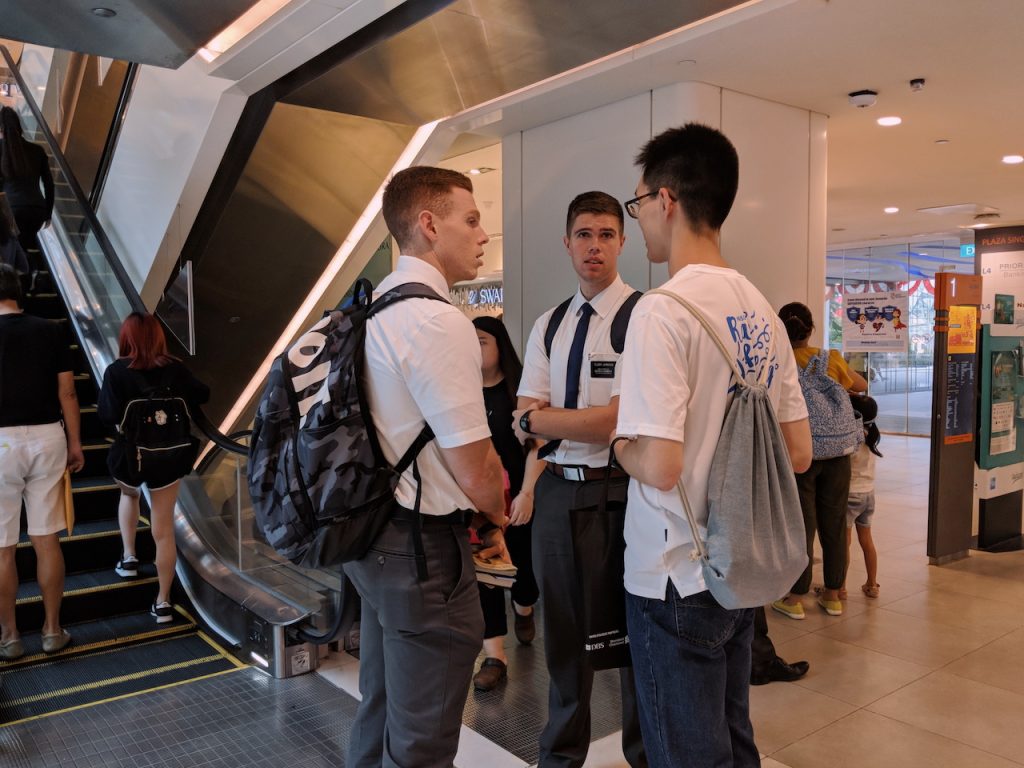
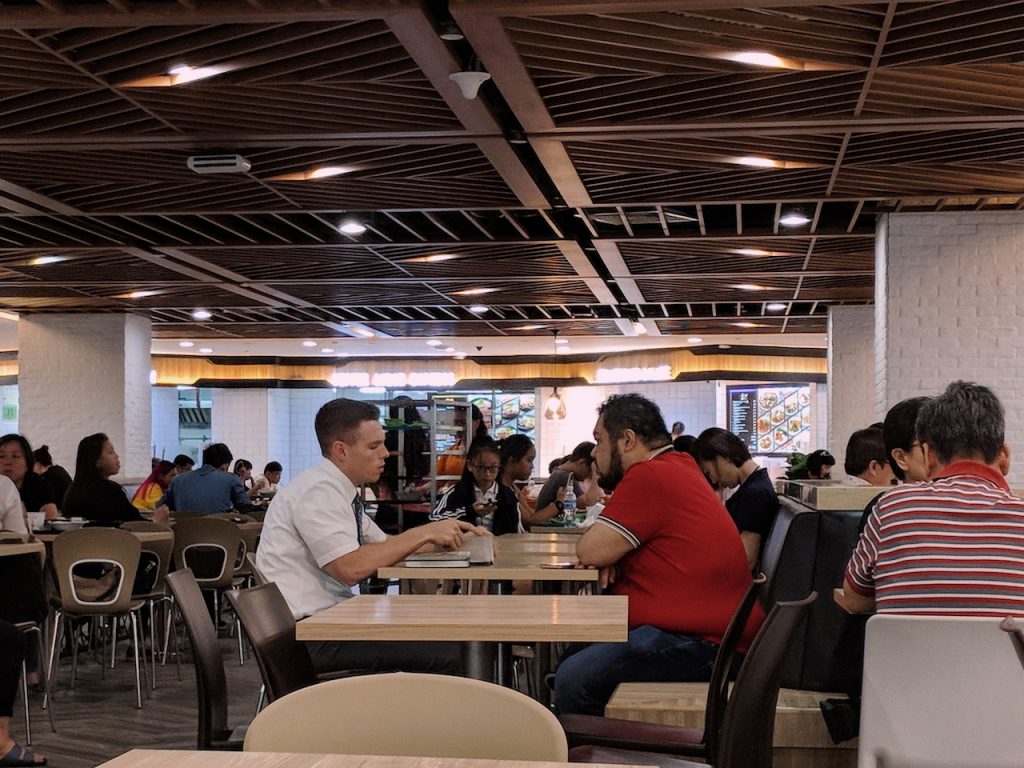
Jumping on a Whatsapp call with an Elder in Sibu, Elder Johnson checks in on how the Sibu missionaries have been doing. In another room, Elder Olive gets updates on the Sisters in Clementi and Bedok.
Each call begins with a prayer. Then the Elders request for four numbers from whoever’s on the line: first, the number of people they’ve managed to get baptised and confirmed; second, those who have set a baptism date; third, those who agreed to a meeting with a missionary; and last, those who agreed to come to Church.
To keep things organised, these numbers are keyed into an Excel spreadsheet. I colloquially refer to this as their KPI log book, where their ‘KPIs’ represent people they’ve managed to educate about their faith.
“We are huge fans of efficiency,” shares Elder Olive. “Like your MRT. I love it. It works so well.”
“Oh, so that is how you measure ‘success’?” I joke, thinking of all the times our MRT has broken down.
He replies, “A ‘successful’ mission is simply about commitment to the work. There are some missionaries that get one or two people to Church, some that have 30 or 40. But for me it’s just about whether you have given Heavenly Father your all every day.”
As much they like plans and numbers, Elder Johnson reminds me that numbers still represent people.
After the numbers are logged, the Elders share their challenges from the previous week. They end the phone call with another prayer—this time, Elder Olive does it in Mandarin, while Elder Johnson says a prayer in Bahasa Melayu.
Many missionaries are effectively bilingual, since many don’t have the fortune or choice of getting posted to countries that speak their native language. They tell me that Mission Assignments are made by the Prophet of the Church, while specific city or area assignments in the Singapore Mission are made by President Rowley “after prayer and inspiration”.
They also believe that they’re able to pick up a new language easily through diligent daily study, speaking the language daily, “prayer and guidance from our Father in Heaven”, and “with prompting from the Spirit”. All this may sound super cheesy, but I suppose that if you truly believe in whatever you hope to impart, then you will do everything in your power to get your message across.
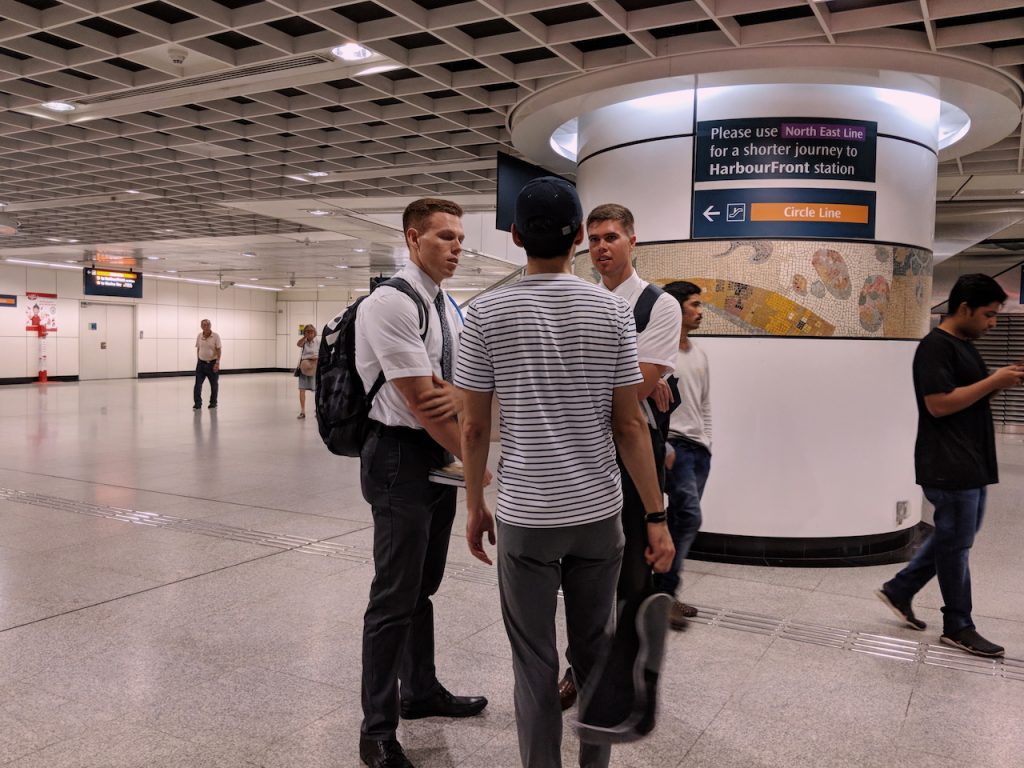
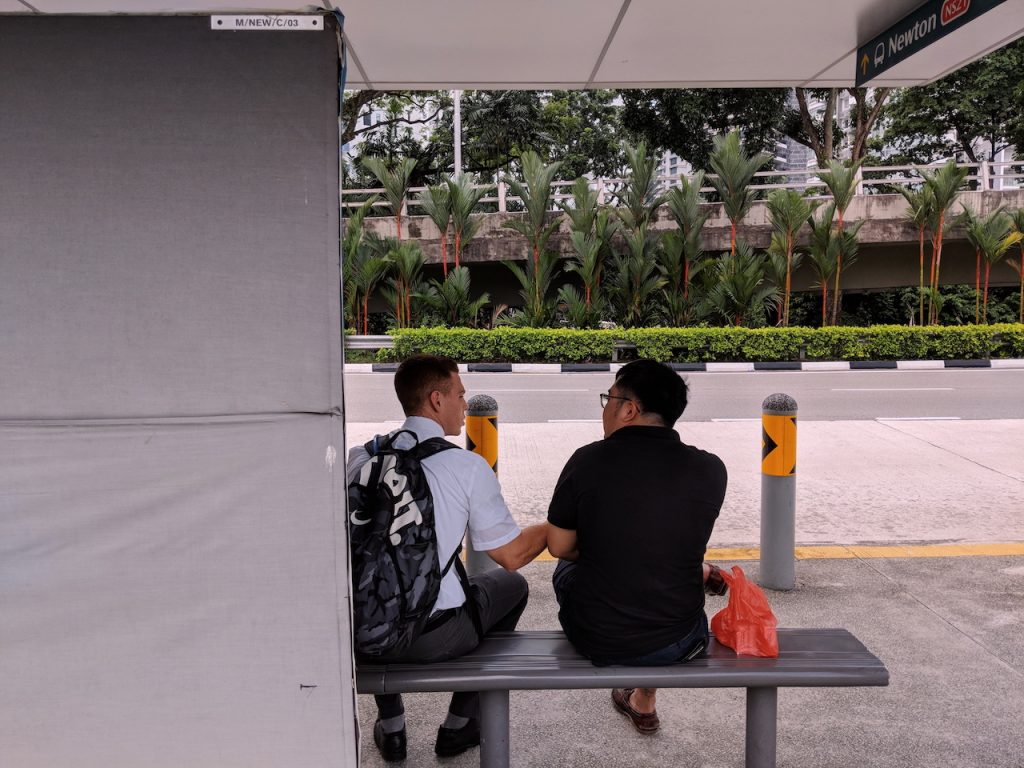
For the same reason, members of the Church are also asked to refrain from alcohol, tobacco, tea and coffee, not just while they are on their mission.
Even for someone who is task-oriented, I find this overly restrictive. But I am alone in feeling this way. Over and over again, the Elders reiterate their commitment to their mission, making me rethink my lack of deep devotion to any cause.
“No one would give up two years of their life for something they didn’t believe in, so it’s important that we know what we believe in and that we’re ready to share with others to help them,” says Elder Johnson.
Sharing forms a huge part of mission trips. If missionaries are not ‘performing’ in their wards, they may be moved around to other wards.
Just before we leave the Church to head to Dhoby Ghaut, both the Elders share with me a task app, which they use to manage their to-do list. It’s filled with names of people they plan to follow-up with. The next 30 minutes are spent sending messages and video greetings, and calling people to enquire if they’re still keen to come to Church.
So far, I feel as though I’m accompanying salesmen with boundless energy to close a deal—I can’t decide if I’m averse to it, or if I admire them.
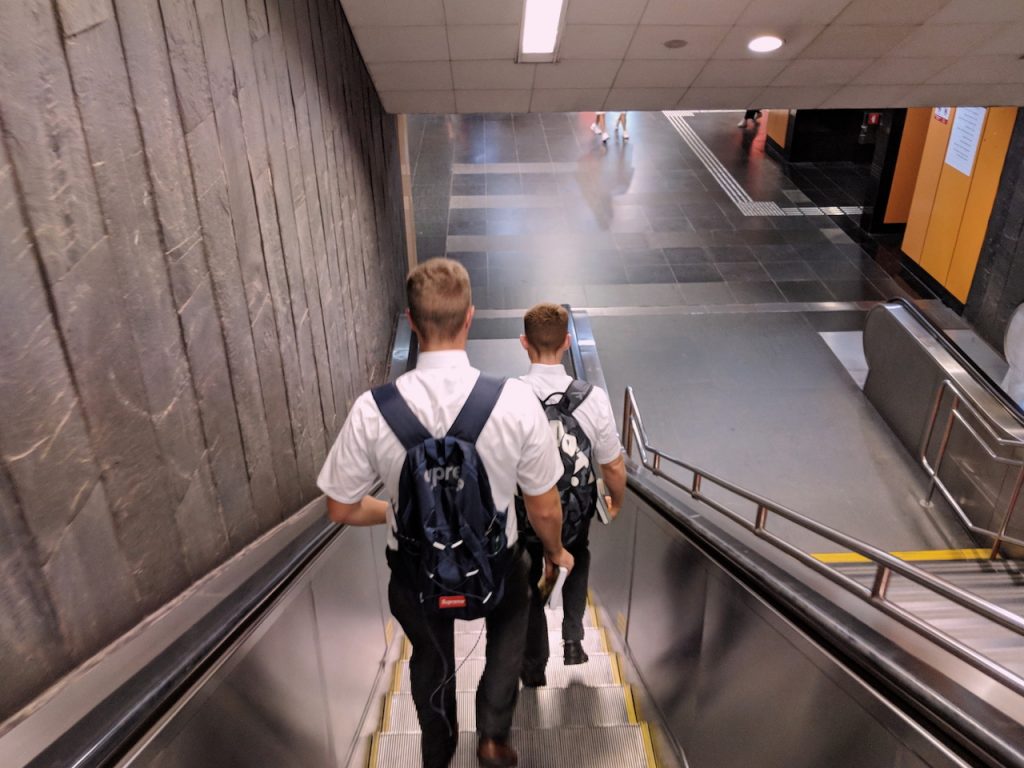
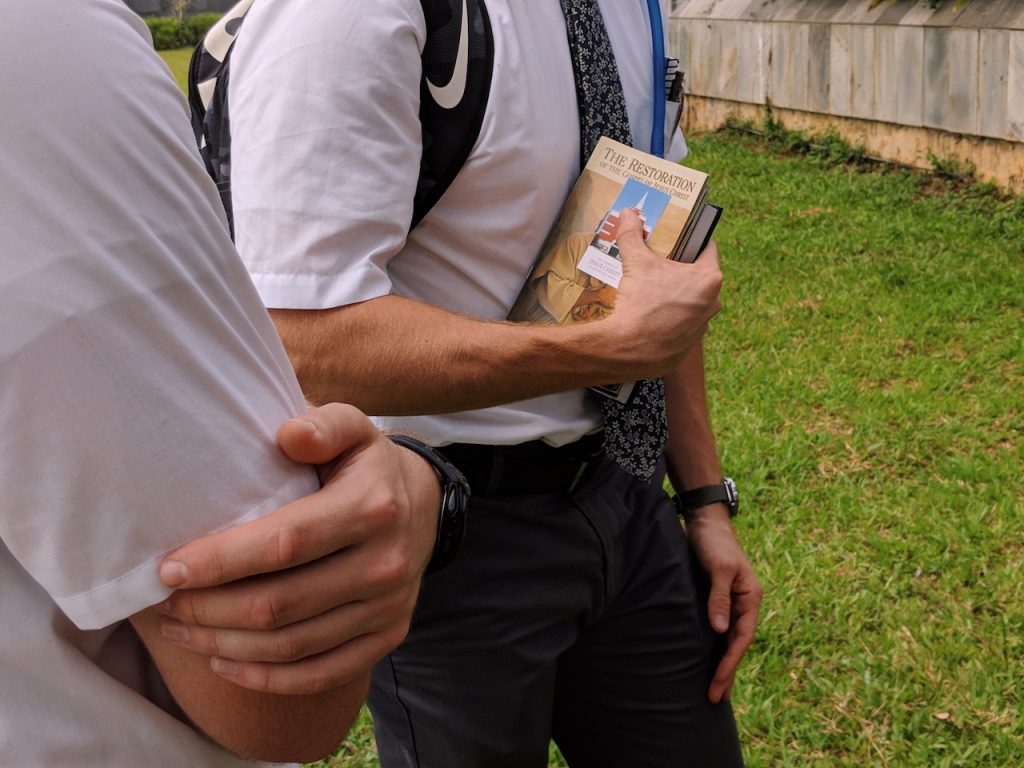
Many of us are familiar with people proselytising on the streets. These occasions are rarely pleasant; we tend to see them as nothing more than religious zealots.
Yet perhaps because I’ve warmed up to Elder Olive and Elder Johnson, I see them as two men I would hang out with if we’d met under different circumstances. I dare say that just for today at least, we’ve become friends.
As such, it feels more inspiring than irritating when I see their persistence and earnestness when they approach unsuspecting strangers to talk about their faith. I have no qualms approaching strangers, but even I have to admit my forthrightness is no match for their enthusiasm.
They also speed-walk pretty damn well, ensuring I get in a second workout for the day.
On our way to Newton MRT station, which is just five minutes from the Church, they manage to speak with more than a handful of people. At the station, they talk to about seven more people, including some on the escalators and the auntie manning the cashier (!!) in 7-11.
On the train, they approach an NTU student to ask him if he believes in a bigger purpose to life.
He retorts, “Honestly, I just want to find a job. I don’t want to pretend there is a God.”
This is a common sentiment shared among at least a handful of other people that day, but the Elders effortlessly shrug off all rejection.
Arriving at Dhoby Ghaut, we head to Plaza Singapura, where we scope out the shopping mall one floor at a time. In places like McDonald’s and the food court, the Elders approach people who are eating alone. Most of these people entertain them, even as they decline to attend Church or meet with the Elders for any further discussion about being a member of the Church. Frankly, they’re far more accommodating than I would be in their position.
Before catching a break with me at around tea time, Elder Olive shows me a Whatsapp message he’s just received. One of the men he approached earlier today has indicated his interest in finding out more. I congratulate Elder Olive, but I sense he’s wary not to count his chickens before the eggs hatch.
After four hours of hustling, I learn an effective skill in approaching strangers about potentially controversial topics.
Don’t start off by talking about said topic. Instead, begin with conversational issues, such as the location of the nearest food centre or compliment the person on their fashion sense. Then, slowly segue into your main objective.
That day, almost everyone takes the time to speak with the Elders. Those who don’t wish to be bothered simply brush them off politely.
What surprises me is that the Singaporeans most willing to engage are mostly Christian. They never tell these Elders that their ‘version’ of Christianity is flawed, nor dismiss the Book of Mormon as a sham. In fact, these Christians are open-minded and patient, taking the chance to learn more about the Church of Jesus Christ of Latter-Day Saints.
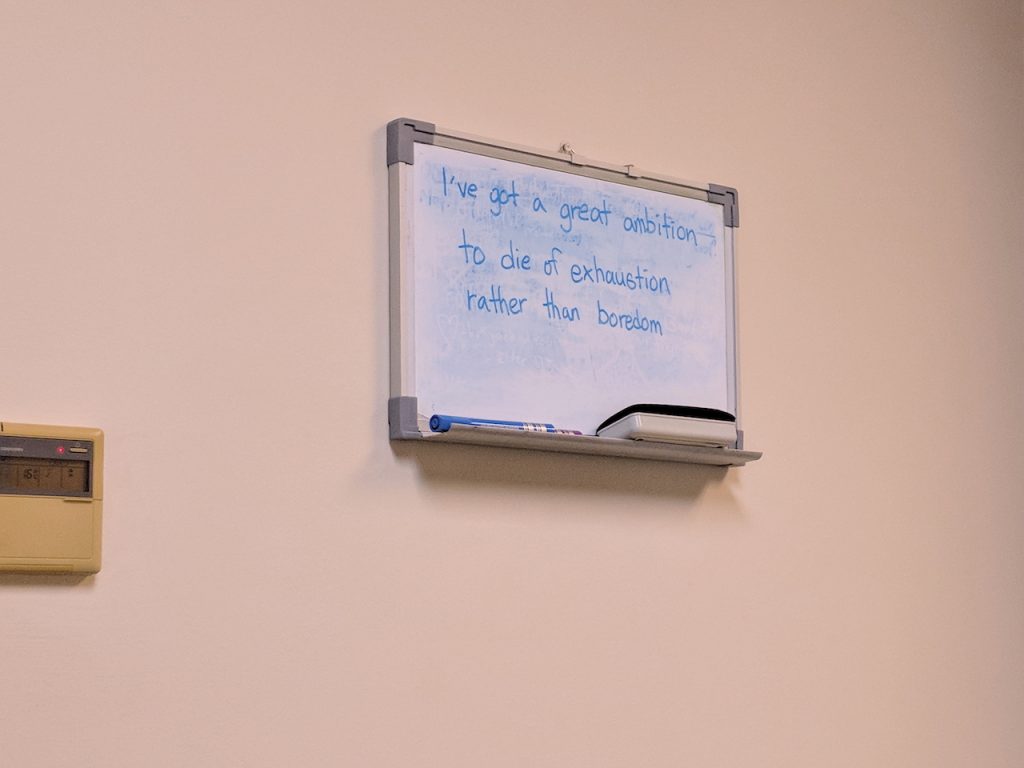
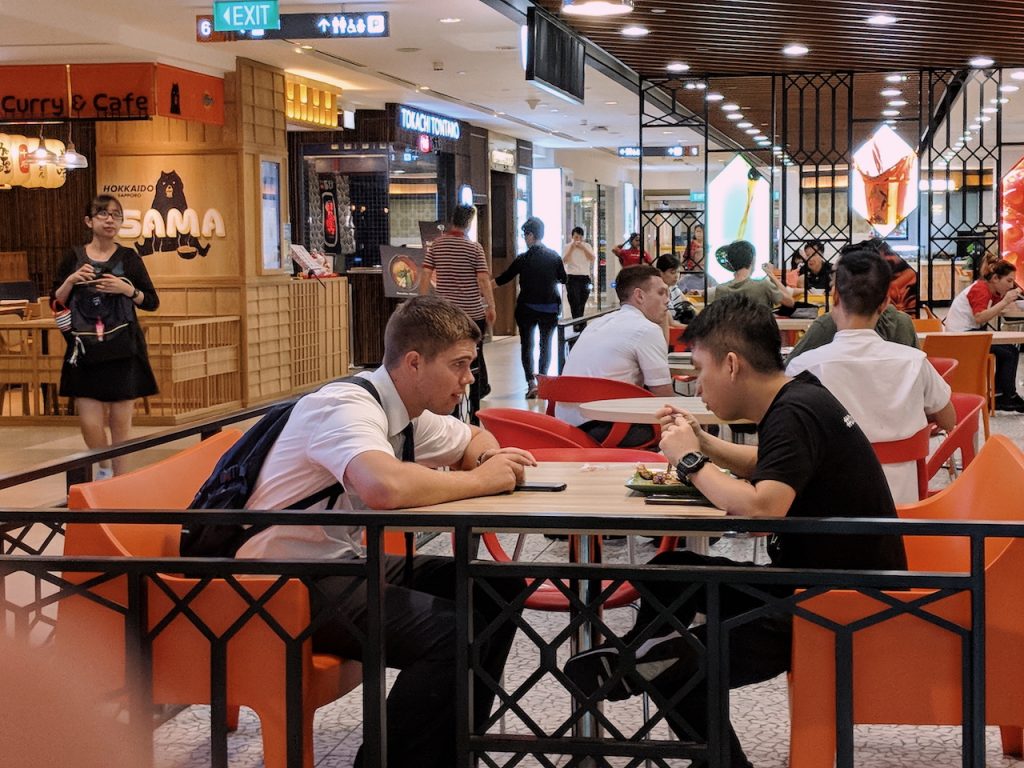
“How is this church different from other churches? We already have prophets from older days, so why is there a living prophet for the Church? How come he took a lot of time before he showed up?”
Beneath Carol’s fast and furious questions, I sense her frustration. She comes from a traditional Christian upbringing, so the Church is a strange notion to her.
“Is the book of Mormon true?” she asks the Elders.
They tell her to pray to God asking that exact question. In fact, they emphasise that it’s better to be extra specific in prayer so answers and signs, if any, are likely to be more precise.
As Carol says the prayer, I recall Elder Olive’s answer earlier in the day when I asked him how the Elders try to convince people to believe.
“The most that we can do is teach and invite them to Church. If they feel the word is true, they act on it.”
Likewise, Elder Johnson presents me a football analogy when discussing how he regards detractors of his faith.
“In the World Cup, if you cheer for Germany, you’re probably going to bash on Argentina. Instead of supporting and cheering for their own team, people often choose to bash the other team.”
Later in the washroom, when Carol and I find ourselves alone, she confides that she’s unsure of the Church. She had chosen to entertain the Elders because she believes in doing thorough research before coming to any conclusion. It’s an honest confession only a total stranger would share; it probably also helps knowing we’d never see each other again.
Before we part ways with the Elders at the Church gate, we say a prayer to round off the night. Anyone in their right mind would choose to call it a day, since it is 9:26 PM, barely four minutes away from their ‘curfew’. The Elders have that little time to get back to their apartment located next to the Church.
Eventually, they wish me goodnight, adding, “We’ll try to catch one more person on our way back who may be looking to hear Christ’s message tonight. See you!”
Then they sprint off into the dark, shielded by nothing more than unbridled passion and their belief in their faith.

